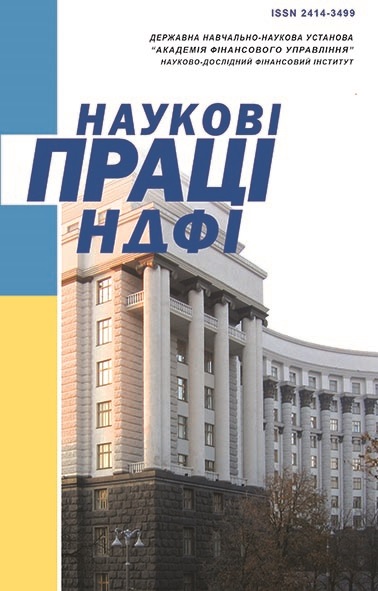
|
№ 3/2018
2. Savchenko, І. H., Chumak, O. V. (2017). Modernization of state mechanism for higher education funding under reforms. Theory and Practice of Public Administration, 3 (58), 1–6 [in Ukrainian]. 3. Hry`shhenko, І. M. (Ed.). (2015). Theoretical and methodological substantiation of effective financial and economic models of higher education development. Ky`yiv: Іnsty`tut vy`shhoyi osvіty` [in Ukrainian]. 4. Varnalіj, Z. S. (2018). Financial support of higher education institutions of Ukraine – state affair (in memory of T. M. Bogolib). Economic Bulletin of the University, 36/1, 9–17 [in Ukrainian]. 5. Iefymenko, T. I. (2016). Conceptual approaches to science funding mechanisms’ development. Finance of Ukraine, 8, 9–23. Retrieved from finukr.org.ua/?page_id=723&aid=4344&lang=uk [in Ukrainian]. 6. Iefymenko, T. I., Gasanov, S. S., & Bohdan, I. V. (2018). State budget expenditures for higher education: structural changes and formula distribution problem. In Bulletin of the Kyiv National University of Technologies and Design. Special issue. The effectiveness of the organizational and economic mechanism of innovative development of higher education in Ukraine (pp. 27–51) [in Ukrainian]. 7. Wawak, T. (2017). Major factors determining the quality of management in universities. Finance of Ukraine, 7, 116–128. Retrieved from finukr.org.ua/?page_id=723&aid= 4445&lang=uk. 8. Vitrenko, Yu. M. (2017). Сosts and education services prices. Finance of Ukraine, 1, 10–25. Retrieved from finukr.org.ua/?page_id=723&aid=4380&lang=uk [in Ukrainian]. 9. Yerfort, O. Yu., Yerfort, I. Yu. (2018). The development of student loans in Ukraine. Finance of Ukraine, 3, 67–79. Retrieved from finukr.org.ua/?page_id=723& aid=4500&lang=uk [in Ukrainian]. 10. Zatonatska, T. H., Herasymenko, O. O., & Lavrentiev, M. M. (2018). Institutional toolkit for the formation of expenditure on general secondary education in Ukraine. Finance of Ukraine, 8, 91–105 [in Ukrainian]. 11. Kyrylenko, O. P., Marchuk, A. P. (2018). Modernization of budget providing of education in the process of sectoral decentralization. Finance of Ukraine, 6, 75–90 [in Ukrainian]. 12. Nikitishyn, A. O. (2016). Tax policy to stimulate human capital development. Finance of Ukraine, 10, 113–127. Retrieved from finukr.org.ua/?page_id=723&aid =4362&lang=uk [in Ukrainian]. 13. Osetskyi, V. L., Tatomyr, I. L. (2016). Features of using endowments and fundraising in educational practices. Finance of Ukraine, 3, 86–100. Retrieved from finukr.org.ua/?page_id=723&aid=4302&lang=uk [in Ukrainian]. 14. Petrakov, Ya. V. (2017). Higher education funding models in Europe and the world. Finance of Ukraine, 12, 95–121. Retrieved from finukr.org.ua/?page_id=723&aid =4476&lang=uk [in Ukrainian]. 15. Sokolovska, A. M., Petrakov, Ya. V. (2018). Foreign models of science funding. Finance of Ukraine, 2, 48–71. Retrieved from finukr.org.ua/?page_id=723&aid=44 90&lang=uk [in Ukrainian]. 16. Sokolovska, A. M. (2018). Discussion aspects of formula distribution of state expenditure on higher education in Ukraine. Finance of Ukraine, 5, 8–21 [in Ukrainian]. 17. Storonianska, I. Z., Benovska, L. Ya. (2017). Budgetary provision for education in the local communities of the Carpathian region: challenges of modern reforms. Finance of Ukraine, 7, 7–24. Retrieved from finukr.org.ua/?page_id=723&aid= 4438&lang=uk [in Ukrainian]. 18. Sushko, N. I., Danylenko, S. V. (2018). Improving the regulation of public expenditure on higher education services. Finance of Ukraine, 4, 56–74. Retrieved from finukr.org.ua/?page_id=723&aid=4506&lang=uk [in Ukrainian]. 19. Tatomyr, I. L. (2017). Perspective directions of venture investing of education startups. Finance of Ukraine, 7, 43–55. Retrieved from finukr.org.ua/?page_id=723& aid=4440&lang=uk [in Ukrainian]. 20. Cedefop (European Centre for the Development of Vocational Training). (2009). Using tax incentives to promote education and training. Luxembourg: Office for Official Publications of the European Communities. Retrieved from www.cedefop.europa.eu/files/5180_en.pdf. 21. Cabinet of Ministers of Ukraine. (2010). List of types of payments made at the expense of employers, for which a single contribution to the compulsory state social insurance is not charged (Decree No. 1170, December 22). Retrieved from zakon2.rada.gov.ua/laws/show/1170-2010-%D0%BF [in Ukrainian]. 22. Ministry of Finance of Ukraine. (2015). On approval of the Procedure for the formation and submission by the insurers of a report on the amounts of the accrued single contribution to the mandatory state social insurance (Order No. 435, April 14). Retrieved from zakon2.rada.gov.ua/laws/show/z0460-15 [in Ukrainian]. 23. Verkhovna Rada of Ukraine. (2010). Tax Code of Ukraine (Act No. 2755-VI, December 2). Retrieved from sfs.gov.ua/nk/rozdil-iv--podatok-na-dohodi-fizichnih-o// [in Ukrainian]. 24. Susan, K. U. (2017, February). How Governments Support Higher Education through Tax Code. Federal and State income tax provisions aim to reduce costs for students and families. The PEW charitable trusts. Retrieved from www.pewtrusts.org/~/media/assets/2017/02/how-governments-support-higher-education-through-tax-code.pdf. 25. Zadorozhnya, L. (2015). Assessment of efficiency of individual income tax privileges in Ukraine. Economist, 9. Retrieved from ndi-fp.nusta.edu.ua/report/publication/20161025123114.pdf [in Ukrainian]. 26. Higher Education Authority. (n. d.). The Free Fees Initiative in Ireland. Retrieved from hea.ie/funding-governance- performance/funding/student-finance/course-fees/. 27. European Commission. (2006). Council Directive 2006/112/EC of 28 November 2006 on the common system of value added tax. Retrieved from zakon2.rada.gov.ua/laws/show/994_928/page3 [in Ukrainian]. 28. Cabinet of Ministers of Ukraine. (2015). On approval of Licensing conditions for educational activities of educational institutions (Decree No. 1187, December 30). Retrieved from zakon5.rada.gov.ua/laws/show/1187-2015-%D0%BF [in Ukrainian]. 29. Verkhovna Rada of Ukraine. (n. d.). On amendments to the Tax Code on non-profit status of higher educational institutions and research institutions (Draft Law). Retrieved from mon.gov.ua/storage/app/media/gromadske-obgovorennya/proekt-zmin-do-podatkovogo-kodeksu-ukrayini.pdf [in Ukrainian]. 30. Department of Finance Canada. (2017). Report on Federal Tax Expenditures – Concepts, Estimates and Evaluations. Retrieved from www.fin.gc.ca/taxexp-depfisc/2017/taxexp1702-eng.asp. 31. Tax Incentives for Private Education Institutions. (2015, February 24). studymalaysia.com. Retrieved from www.studymalaysia.com/education/useful-topics/tax-incentives-for-private-education-institutions. 32. Oxford thinking. (n. d.). Tax-efficient giving. Retrieved from www.campaign.ox.ac.uk/donate/tax-efficient-giving. |
|
|
|
|
THE ACADEMY OF FINANCIAL MANAGEMENT |

|
|
|



